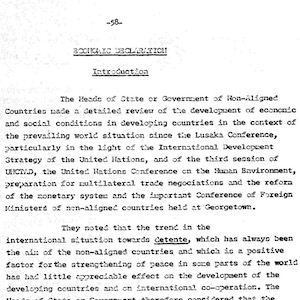Short Teaching Module: The Nonaligned Movement and Cold War Détente
Overview
Since the early Cold War, neutral and nonaligned countries sought to overcome the division imposed by bipolar order. One of the most notable efforts to transcend the power dynamic of superpower relations was the Nonaligned Movement, formed in the early 1960s. The movement was at the apex of its influence during détente in the 1970s, tapping into the existing sense of anxiety among small- and medium-sized states over spheres of influence, neocolonialism, and economic inequality. In this decade, the movement came forward with several initiatives that aimed to resolve global political and economic problems. However, internal differences and conflicts among its members and the dissolution of détente rendered its efforts futile.
Essay
The 1970s marked a transformative period in the post-World War II global order. Anti-colonial struggle entered its final phase with the last Portuguese colonies gaining independence in the second half of the decade. The oil crisis and the breakdown of the Breton Woods system which had governed monetary relations between nations since 1944, changed global economic patterns. The power of the nation-state was challenged by the so-called Brezhnev doctrine of limited sovereignty, but also by the emergence of transnational actors who scrutinized the state governments’ human rights abuses and environmental neglect. Finally, détente defused tensions between the United States and the Soviet Union that had developed during the early Cold War.
In teaching this decade, the primary focus is often the superpowers’ competition and/or cooperation. However, the challenges of the 1970s revived and galvanized alternative projects to create a global order that would transcend the power dynamic of superpower relations. On the forefront of these efforts was the Nonaligned Movement (NAM), formed in 1961, Belgrade, Yugoslavia. The Belgrade summit came in the aftermath of the 1955 Bandung Asian–African Conference and the 1956 Brijuni meeting between Yugoslavia’s, Egypt’s, and India’s respective heads of state as one of the most important initiatives to transform the Cold War. These efforts deserve attention, as they dethrone a narrative that concentrates only on the superpowers.
A lessening of tensions between the superpowers in the late 1960s and early 1970s was in general a welcome development, but détente was not universally applauded. Many small- and medium-sized states in and outside the blocs feared the Great Power division of spheres of influence, which would further undermine their political independence and sovereignty and exacerbate economic and developmental problems. Small states, particularly those who claimed neutrality and nonalignment, tried to respond to these challenges by taking responsibility for the international system – no small feat for them.
The NAM, however, became dormant after 1964 because of Beijing’s disruptive influence on and political shifts in nonaligned states, including coups, depositions, and regime changes. In 1968 and 1969, the first initiatives appeared to resuscitate the movement, resulting in the 1970 Lusaka summit and three subsequent summits in Algiers, Colombo, and Havana by the end of the decade, along with numerous initiatives through such UN bodies as UNCTAD and G–77. A dramatic increase in the number of movement members, from 25 states in 1961 to 88 in 1979, testified to the appeal of an alternative to the superpowers-centric order.
Many NAM members warned about “deep and structural changes in the international economic system,” which included ever-increasing economic interdependence, poverty, inflation, and unemployment, followed by the breakdown of balance-of-payments, and a widening economic inequality between developed and developing countries. “The explosion of discontent of the undeveloped and the hungry could be more dangerous for the world than the explosion of the atomic bomb,” one Yugoslav official warned before the 1976 Colombo summit.
Nonaligned states maintained that a more just global economic system and democratization of international affairs would resolve these problems. The transformation of the economic system, outlined in 1974 by the Algerian president Houari Boumédiène that would be known under the name of “New International Economic Order,” included economic solidarity among underdeveloped and developing countries; equal and open access to technology; and a moral responsibility of developed nations–particularly former colonial powers–to invest in developing nations and help their modernization efforts without political strings attached.
At the same time, the democratization of international affairs aimed at breaking the hierarchical structure of the existing order, providing equal status to big and small countries in the international arena; the rejection of imperialism, colonialism and neocolonialism, and any other sort of foreign domination; and the principles of non-interference in other countries’ affairs, safeguards for their unobstructed political and economic development.
Although nonaligned states believed that détente stabilized some aspects of international relations, they were convinced that the superpowers’ agreement paved the way for different and more sinister forms of interventionism. Along with “classic” forms of intervention such as military efforts, the superpowers also used new forms of domination, including economic pressures and “technological and informational colonialism.” They helped the subversive activities of disgruntled religious and ethnic groups, which contributed to tribalism, nationalism, and religious extremism. NAM members pointed out the weakening of the blocs’ cohesion and discipline had led to an increase in the power of local actors and their tendency to “settle scores” and acquire regional hegemony in the power vacuum.
The NAM movement tried to turn these aims into reality with a variety of measures. However, diverse and often conflicting interests, a struggle for primacy between “progressive” and “moderate” wings of the movement, and the decline and collapse of détente in the late 1970s made nonaligned states incapable of dismantling the structure of the Cold War. Despite their lack of success, including the NAM in any discussion of the 1970s provides a more global perspective on the Cold War and détente than does a focus on the superpowers alone.
Primary Sources
Credits
Milorad Lazic teaches history at the US Naval Academy. He received his Ph.D. in History from George Washington University in 2020. Milorad is currently writing a book on Yugoslavia and the global Cold War in the 1970s."

